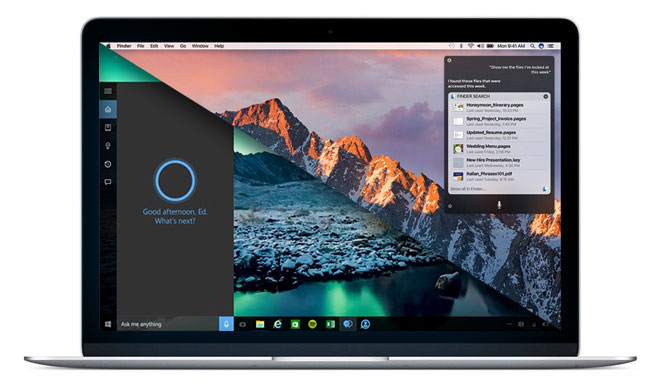Siri Vs Cortana: Your move, Microsoft.

There is no two ways about it: Siri rocked the show at WWDC 2016, showing off the ability to recognize complex commands and parse phrases such as “Show me the files i worked on last week about the offsite”, as uttered by Apple’s Craig Federighi, on stage in San Francisco, to a MacBook running macOS Sierra. Even further, Siri displayed the ability to listen for follow-up queries, like “...just the ones that Ken sent me that i tagged with ‘draft’...”.
This last example should ring a bell to those who are familiar with some of the more advanced Google search features, introduced a few short years ago, some of which is frequently used on mobile devices. For instance, when asking Google “Who is Pete Townshend?”, it will reply with some generic information gathered from Wikipedia, but if we were to ask Google, simply, “How old is he?” without mention of Pete Townshend’s name, Google would still answer the question within context, and answer promptly: “He’s 71 years old”. Taking it one step further, we could ask “what’s his last album?”, at which point Google would either find enough information to provide an answer for that, or simply revert to a list of search results including Pete Townshend’s discography, as well as the band “The Who”.
Semantic contextual search is an extremely important feature, and one that truly sets the standard on the helpfulness of a virtual assistant. While Cortana’s reliance on Bing is one factor that’s holding it back in terms of search accuracy and its ability to understand complex queries, local search holds considerable weight in how virtual assistants abilities stack against each other. Prior to WWDC 2016, Cortana was still at the forefront of introducing a virtual assistant within a desktop environment, and it works brilliantly for certain tasks, such as as sending email, searching the web (alas, one question at a time), and displaying news, weather and traffic information, among other things.
The good news is that the Windows 10 Anniversary update is yet to come, most likely with a laundry list of features set to enable Cortana to provide users with an improved experience close to what we have seen on stage at WWDC 2016. Last month, we have talked about a “Cortana wish list”, that included some of the features demonstrated by Siri on Monday, as well as some that are still currently missing across all virtual assistants, such as the ability to open URLs. The latter of which, would most certainly tip the scale in favor of Cortana, if Microsoft were to introduce such feature.